Get Free Solar Panel Quotes from Top Solar Installers
Compare Solar Prices & Save Money
SolarCompaniesHub makes it easy to get free, no-obligation Solar Panel Quotes. Compare offers from reputable solar installers in your area and find the perfect solution for your home or business.
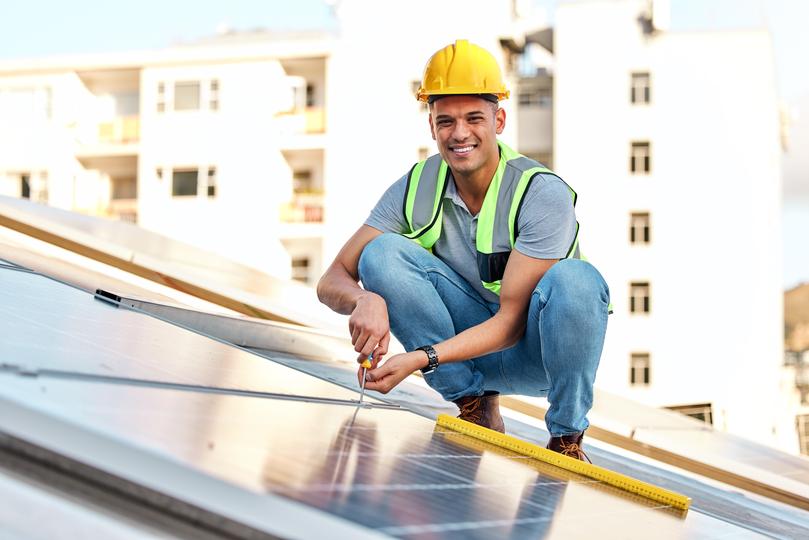
Discover Additional Solar Services
SolarCompaniesHub offers a comprehensive directory of solar services. Find specialists for solar panel repair & maintenance, solar financing options, solar battery storage.
Find certified solar installers near you. Get quotes for solar panel installation, repair, and maintenance services.
Reduce your business energy costs with solar. Find trusted commercial solar installers and get expert advice on your project.
Keep your solar panels running smoothly. We offer expert solar panel repair and maintenance services to maximize your energy savings.
Getting Solar Panel Quotes is Easy with SolarCompaniesHub
We simplify the process of receiving competitive solar quotes from trusted installers in USA.
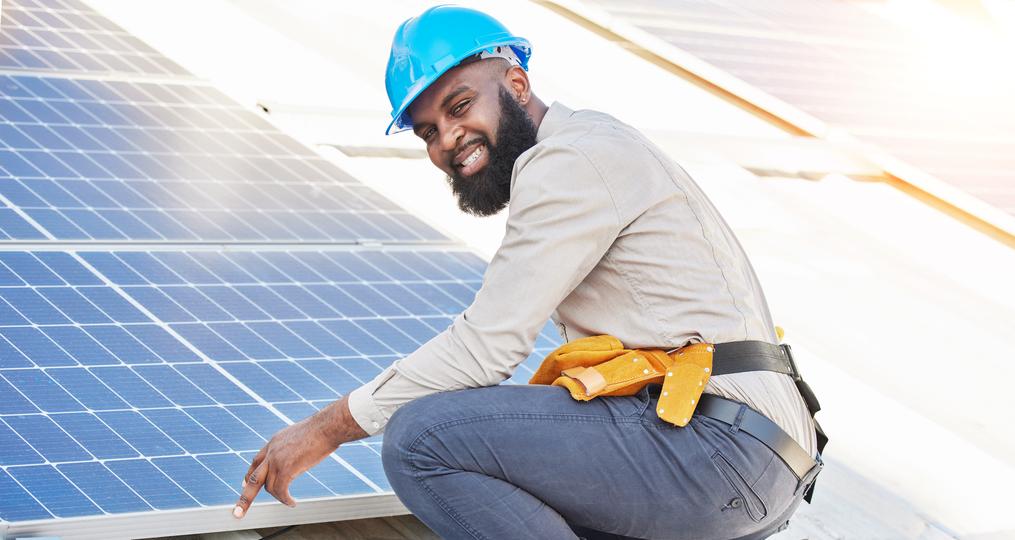
- Tell Us About Your Energy Needs
- Provide some basic information about your property, energy usage, and desired solar system size.
- Get Matched with Local Installers
- We'll connect you with reputable solar installers in your area who can provide accurate and competitive Solar Panel Quotes.
- Compare Quotes & Choose the Best Fit
- Review the quotes, compare pricing, system options, and warranties. Choose the solar installer who best meets your needs and budget.
- Go Solar with Confidence!
- With the right solar installer and a clear understanding of the costs and benefits, you can confidently make the switch to clean, renewable energy.
Why Use SolarCompaniesHub for Solar Panel Quotes?
Why Choose SolarCompaniesHub for Your Solar Needs?
Getting Solar Panel Quotes shouldn't be complicated. SolarCompaniesHub makes it easy and hassle-free to compare solar pricing from reputable installers in USA. Here's why you should choose us: We make it easy to find and compare qualified solar installers in your area. Here's how:
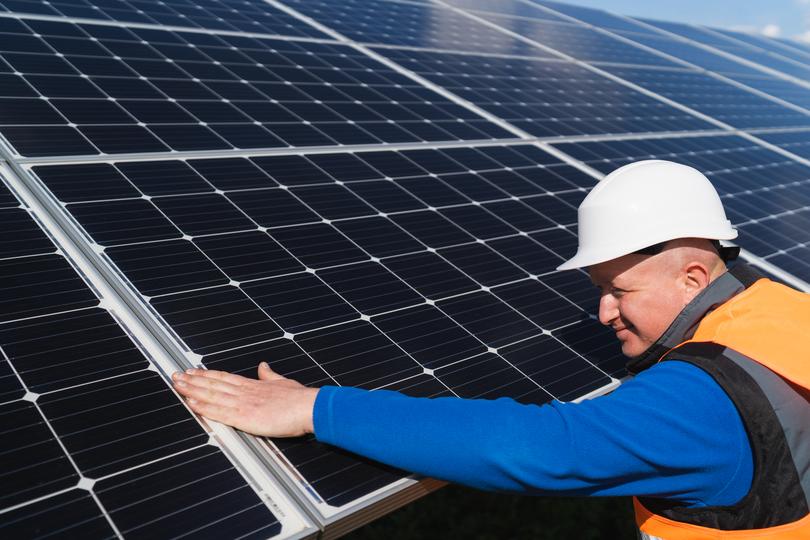
- Save Time & Effort
- Searching for solar installers and requesting quotes individually can be time-consuming. We simplify the process by connecting you with multiple installers in your area with a single request.
- Compare Prices & Options
- Receive quotes from various installers, allowing you to compare prices, system options, financing plans, and warranties side-by-side.
- Vetted & Reputable Installers
- We partner with qualified and licensed solar installers who meet our standards for experience, reliability, and customer satisfaction.
- No-Obligation Quotes
- Requesting quotes through SolarCompaniesHub is free and carries no obligation. You're free to choose the installer and offer that best suits you.
- Expert Guidance
- If you have questions about solar energy or need help choosing the right system, our team can provide expert guidance and support.
- Free To Use
- Our service is completely free for homeowners and businesses. There are no hidden fees or charges.
Get Competitive Quotes for Commercial Solar
Solar for Your Business
SolarCompaniesHub helps businesses find the best solar solutions to reduce energy costs and achieve sustainability goals. Get quotes from experienced commercial solar installers and explore financing options tailored to your business.
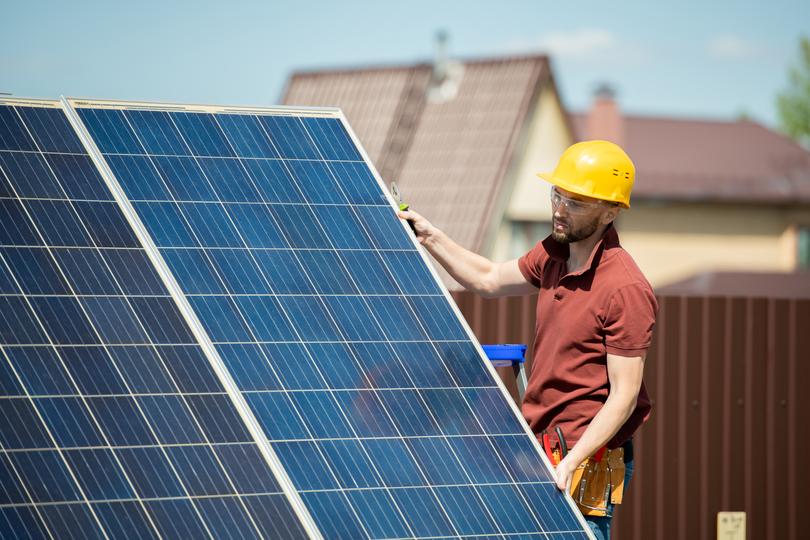
Reduce your business energy costs with solar. Find trusted commercial solar installers and get expert advice on your project.
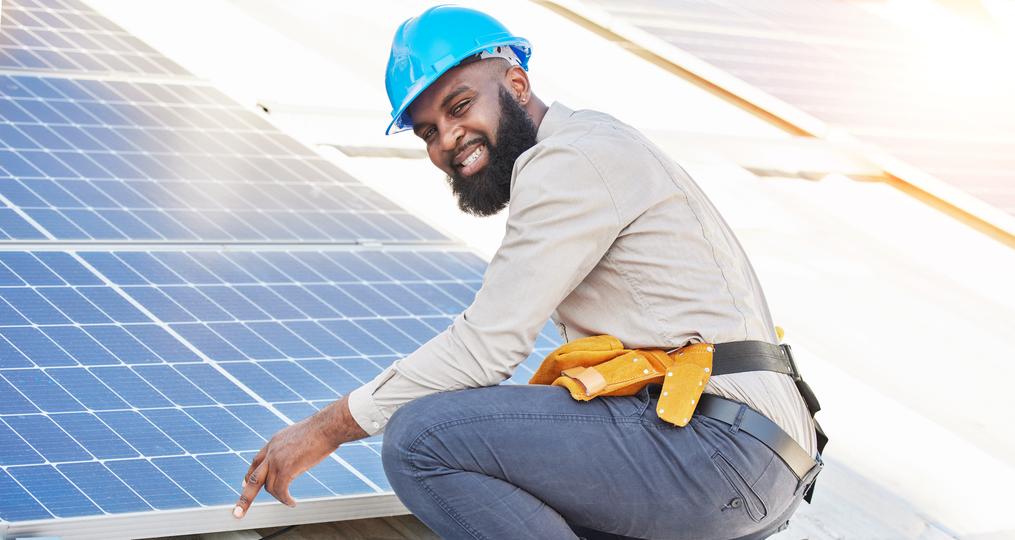
Keep your solar panels running smoothly. We offer expert solar panel repair and maintenance services to maximize your energy savings.

Get free, no-obligation solar quotes from top-rated installers in your area. Compare prices and find the best solar solution for your needs.
Power Your Home with Clean, Affordable Energy
Solar for Your Home
Find the right solar system for your home with free, no-obligation quotes from trusted installers. Compare prices and start saving on your electricity bills.

Find certified solar installers near you. Get quotes for solar panel installation, repair, and maintenance services.

Keep your solar panels running smoothly. We offer expert solar panel repair and maintenance services to maximize your energy savings.

Get free, no-obligation solar quotes from top-rated installers in your area. Compare prices and find the best solar solution for your needs.
Ready to Make the Switch to Solar?
Get Your Free Solar Panel Quotes Now!
Compare solar prices, explore system options, and find the perfect installer for your needs. It's easy, fast, and free on SolarCompaniesHub.
Understanding Your Solar Panel Quotes: A Glossary of Terms
Kilowatt (kW)
Kilowatt-hour (kWh)
Solar Panel Efficiency
Solar Panel Type
Inverter
Microinverter
Power Optimizer
Net Metering
Solar Battery Storage
System Size
Installation Costs
Warranty
Payback Period
Return on Investment (ROI)
Solar Incentives
Frequently Asked Questions about Solar Panel Quotes
How do I get solar panel quotes?
How much does a solar panel system cost?
- System Size (kW): Larger systems generate more power and cost more.
- Panel Type: Higher-efficiency panels tend to be more expensive upfront.
- Roof Complexity: Difficult roof angles, obstructions, or multiple roof planes can increase installation costs.
- Location: Labor and material costs can vary depending on your geographic location.
- Financing Options: The cost will also be affected by whether you choose to purchase the system outright, lease it, or enter into a Power Purchase Agreement (PPA).
- Incentives and Rebates: Available incentives, like tax credits and rebates, can significantly reduce the overall cost.
How long does it take to get solar panel quotes?
What should I look for in a solar panel quote?
- System Size (kW): Make sure the system size is appropriate for your energy needs.
- Panel Type and Efficiency: Consider the type and efficiency of the panels offered. Higher-efficiency panels generate more power from the same amount of sunlight.
- Inverter Type and Warranty: The inverter is a crucial component of your solar system, so check the type and warranty offered.
- Total Cost and Financing Options: Compare the total cost, including installation, and explore the financing options available, such as cash purchases, loans, leases, or PPAs.
- Warranty Coverage: Review the warranty coverage for the panels, inverter, and workmanship.
- Estimated Energy Production and Savings: Look for projections of your solar system's energy production and potential savings on your electricity bills.
- Company Reputation and Experience: Research the installer's reputation, experience, and customer reviews.
Are solar quotes free?
What information do I need to provide to get a solar quote?
- Your Address: Installers need your address to assess your roof's solar potential and local sunlight conditions.
- Average Monthly Electricity Bill: This helps determine your energy usage and the appropriate system size.
- Roof Type and Orientation: The type, angle, and orientation of your roof affect solar panel placement and energy production.
- Any Shading Obstructions: Note any trees or buildings that might cast shadows on your roof during the day.
- Desired System Size (if known): If you have a specific system size in mind, let the installer know.
- Financing Preferences: Indicate whether you are interested in purchasing, leasing, or financing your solar system.
How long are solar panel quotes valid for?
What is a solar site assessment?
- Inspect Your Roof: Assess the condition, size, angle, and orientation of your roof to determine its suitability for solar panels. They'll also identify any potential obstructions, such as vents, chimneys, or dormers.
- Measure Solar Irradiance: Use tools to measure the amount of sunlight that hits your roof, which affects your system's energy production potential.
- Evaluate Electrical System: Inspect your electrical panel and wiring to ensure they can handle the additional load from a solar system.
- Discuss Your Energy Needs: Review your energy consumption patterns and discuss your goals for going solar.
- Answer Your Questions: Address any questions or concerns you may have about solar panel installation, costs, financing, or maintenance.
Is my roof suitable for solar panels?
- Sunlight Exposure: Your roof should receive adequate sunlight for a significant portion of the day. South-facing roofs (in the Northern Hemisphere) are generally ideal, but east- or west-facing roofs can also be suitable.
- Roof Size: You'll need enough roof space to accommodate the desired number of solar panels. The size of your solar system will depend on your energy needs.
- Roof Angle (Pitch): The angle of your roof affects the efficiency of solar panels. While most roof pitches are suitable for solar, installers can adjust the panel tilt to optimize sun exposure.
- Roof Condition: Your roof should be in good condition and have several years of life remaining. If your roof is nearing the end of its lifespan, it's best to have it replaced before installing solar panels.
- Structural Integrity: Your roof must be structurally sound to support the weight of the solar panels.
What are the different financing options for solar panels?
- Cash Purchase: You pay for the system upfront. This provides the greatest long-term savings but requires a larger initial investment.
- Solar Loans: Loans designed specifically for solar panel systems, often with favorable interest rates and terms.
- Solar Leases: A third-party company owns the system and leases it to you, allowing you to go solar with little or no upfront cost. However, you do not own the system and may not be eligible for all tax benefits.
- Power Purchase Agreements (PPAs): Similar to a lease, but you purchase the electricity generated by the system at a fixed rate per kWh. You do not own the system.
What are the benefits of getting multiple solar quotes?
- Compare Prices: Quotes from different installers can vary, allowing you to find the most competitive price for your solar system.
- Evaluate System Options: Installers may offer different solar panel brands, inverter types, and system designs. Getting multiple quotes gives you a broader range of options to consider.
- Assess Financing Options: Installers may have different financing options available, such as loans, leases, or PPAs. Comparing these options helps you choose the best fit for your budget.
- Review Warranties: Quotes will outline the warranty coverage for panels, inverters, and workmanship. Comparing warranties from different installers ensures you're getting the best protection for your investment.
- Check Company Reputation: Getting quotes from multiple companies allows you to research their reputation, experience, and customer reviews, helping you choose a reliable and trustworthy installer.
Should I get quotes from national solar companies or local installers?
National Solar Companies: Often have a larger reach and may offer more standardized systems and financing options.
Local Installers: May provide more personalized service, have better knowledge of local regulations and incentives, and offer competitive pricing.
Comparing quotes from both types of companies allows you to assess a wider range of options and choose the best fit for your needs.
What are some common solar panel scams to avoid?
- High-Pressure Sales Tactics: Be wary of installers who use aggressive sales tactics or try to pressure you into signing a contract on the spot.
- Too-Good-to-Be-True Offers: Be skeptical of offers that seem significantly cheaper than other quotes or promise unrealistic energy savings.
- Upfront Payment Demands: Reputable installers will typically require a deposit, but avoid companies that demand full payment before work begins.
- Lack of Credentials: Ensure the installer is licensed, insured, and certified. Verify their credentials and check for online reviews.
- Unrealistic Guarantees: Be wary of companies that guarantee a specific amount of energy savings without a proper site assessment or that make exaggerated claims about system performance.
Are solar panels a good investment?
- Lower Energy Costs: Solar panels can significantly reduce or eliminate your monthly electricity bills, providing long-term cost savings.
- Increase Property Value: Homes and businesses with solar panels often have higher property values, making them more attractive to potential buyers or tenants.
- Financial Incentives: Government incentives, such as tax credits and rebates, can significantly reduce the upfront cost of a solar system, improving your return on investment.
- Environmental Benefits: Solar energy is a clean and renewable energy source, reducing your carbon footprint and contributing to a more sustainable future.
What are the different types of solar panel systems?
Grid-Tied Systems: Connected to the utility grid, allowing you to draw electricity from the grid when your solar panels aren't producing enough power (e.g., at night) and sell excess electricity back to the grid.
Off-Grid Systems: Not connected to the utility grid. These systems require battery storage to provide power when the sun isn't shining. Off-grid systems are typically more expensive but offer energy independence.
Within these two categories, there are also variations in:
- Panel Type: Monocrystalline, polycrystalline, thin-film
- Inverter Type: String inverters, microinverters, power optimizers
- Mounting Options: Roof-mounted, ground-mounted,
What are the benefits of a grid-tied solar system?
- Lower Cost: Grid-tied systems are typically less expensive than off-grid systems, as they don't require battery storage.
- Net Metering: You can sell excess solar energy back to the grid for credits on your electricity bill.
- Reliability: You have access to the grid as a backup power source when your solar panels aren't producing enough electricity, such as at night or during cloudy weather.
- Easier Installation: Grid-tied systems are generally simpler to install than off-grid systems.
What are the benefits of an off-grid solar system?
- Energy Independence: You are not reliant on the utility grid for power, making you immune to grid outages or price increases.
- Remote Power: Ideal for locations where grid access is difficult or unavailable.
- Environmental Sustainability: Off-grid systems allow you to live completely on clean, renewable energy.
What are the main components of a solar panel system?
- Solar Panels: Capture sunlight and convert it into DC electricity.
- Inverter: Converts DC electricity from the panels into usable AC electricity.
- Racking and Mounting: Supports and secures the solar panels on your roof or ground.
- Wiring and Connectors: Connects the panels to the inverter and the inverter to your electrical system.
- Monitoring System (optional): Tracks energy production and system performance.
- Battery Storage (for off-grid systems): Stores excess solar energy for later use.
How do I know what size solar panel system I need?
- Offset a Portion of Your Electricity Bill: If you want to reduce your electricity bill but remain connected to the grid, a smaller system might be sufficient.
- Cover 100% of Your Energy Needs: If you aim for energy independence (off-grid), you'll need a larger system with battery storage.
- Your average monthly electricity consumption
- Your roof size and sun exposure
- Available incentives and rebates
- Your budget
How much energy will my solar panels produce?
- System Size: Larger systems with more panels will produce more energy.
- Panel Efficiency: Higher-efficiency panels generate more electricity from the same amount of sunlight.
- Sunlight Exposure: The amount of sunlight your panels receive throughout the day and year.
- Panel Orientation and Tilt: The direction your panels face and their angle relative to the sun.
- Shading: Trees, buildings, or other obstructions that block sunlight will reduce energy production.
- Location: Your geographical location and climate.
What are the different types of solar panel installations?
- Roof-Mounted: Panels are installed on your roof. This is the most common type of installation, as it typically maximizes sun exposure.
- Ground-Mounted: Panels are installed on the ground, either on a fixed rack or a tracking system that follows the sun. This is suitable for properties with ample land.
- Building-Integrated Photovoltaics (BIPV): Solar panels are integrated into the building's design, such as replacing roofing materials or cladding.
What are the environmental benefits of solar energy?
- Renewable Energy Source: Solar energy is a sustainable and inexhaustible resource, unlike fossil fuels.
- Reduced Greenhouse Gas Emissions: Solar panels generate electricity without releasing greenhouse gases like carbon dioxide, reducing your carbon footprint and helping to mitigate climate change.
- Clean Air: Solar energy production does not produce air pollutants that contribute to smog, acid rain, and respiratory problems, improving air quality.
- Reduced Water Consumption: Unlike traditional power plants that require large amounts of water for cooling, solar energy production does not consume water.
- Less Land Disturbance: Solar panel systems can be installed on rooftops or existing structures, minimizing land use impact compared to traditional power plants.
How do I choose the best solar installer for my needs?
- Experience and Reputation: Look for installers with a proven track record and positive customer reviews.
- Certifications and Licensing: Ensure the installer has the necessary certifications (e.g., NABCEP) and licenses to operate in your area.
- Comprehensive Services: Choose an installer who offers a full range of services, from system design and permitting to installation and maintenance.
- Quality Products: Ask about the brands and types of solar panels and inverters they use. Reputable installers will work with high-quality, reliable products.
- Warranty and Customer Support: Review the warranty coverage offered and inquire about their customer support policies.
- Communication and Transparency: Choose an installer who communicates clearly, answers your questions thoroughly, and provides transparent pricing and contract terms.
What is the next step after I receive my solar panel quotes?
How do I get solar panel quotes?
How much does a solar panel system cost?
- System Size (kW): Larger systems generate more power and cost more.
- Panel Type: Higher-efficiency panels tend to be more expensive upfront.
- Roof Complexity: Difficult roof angles, obstructions, or multiple roof planes can increase installation costs.
- Location: Labor and material costs can vary depending on your geographic location.
- Financing Options: The cost will also be affected by whether you choose to purchase the system outright, lease it, or enter into a Power Purchase Agreement (PPA).
- Incentives and Rebates: Available incentives, like tax credits and rebates, can significantly reduce the overall cost.
How long does it take to get solar panel quotes?
What should I look for in a solar panel quote?
- System Size (kW): Make sure the system size is appropriate for your energy needs.
- Panel Type and Efficiency: Consider the type and efficiency of the panels offered. Higher-efficiency panels generate more power from the same amount of sunlight.
- Inverter Type and Warranty: The inverter is a crucial component of your solar system, so check the type and warranty offered.
- Total Cost and Financing Options: Compare the total cost, including installation, and explore the financing options available, such as cash purchases, loans, leases, or PPAs.
- Warranty Coverage: Review the warranty coverage for the panels, inverter, and workmanship.
- Estimated Energy Production and Savings: Look for projections of your solar system's energy production and potential savings on your electricity bills.
- Company Reputation and Experience: Research the installer's reputation, experience, and customer reviews.
Are solar quotes free?
What information do I need to provide to get a solar quote?
- Your Address: Installers need your address to assess your roof's solar potential and local sunlight conditions.
- Average Monthly Electricity Bill: This helps determine your energy usage and the appropriate system size.
- Roof Type and Orientation: The type, angle, and orientation of your roof affect solar panel placement and energy production.
- Any Shading Obstructions: Note any trees or buildings that might cast shadows on your roof during the day.
- Desired System Size (if known): If you have a specific system size in mind, let the installer know.
- Financing Preferences: Indicate whether you are interested in purchasing, leasing, or financing your solar system.
How long are solar panel quotes valid for?
What is a solar site assessment?
- Inspect Your Roof: Assess the condition, size, angle, and orientation of your roof to determine its suitability for solar panels. They'll also identify any potential obstructions, such as vents, chimneys, or dormers.
- Measure Solar Irradiance: Use tools to measure the amount of sunlight that hits your roof, which affects your system's energy production potential.
- Evaluate Electrical System: Inspect your electrical panel and wiring to ensure they can handle the additional load from a solar system.
- Discuss Your Energy Needs: Review your energy consumption patterns and discuss your goals for going solar.
- Answer Your Questions: Address any questions or concerns you may have about solar panel installation, costs, financing, or maintenance.
Is my roof suitable for solar panels?
- Sunlight Exposure: Your roof should receive adequate sunlight for a significant portion of the day. South-facing roofs (in the Northern Hemisphere) are generally ideal, but east- or west-facing roofs can also be suitable.
- Roof Size: You'll need enough roof space to accommodate the desired number of solar panels. The size of your solar system will depend on your energy needs.
- Roof Angle (Pitch): The angle of your roof affects the efficiency of solar panels. While most roof pitches are suitable for solar, installers can adjust the panel tilt to optimize sun exposure.
- Roof Condition: Your roof should be in good condition and have several years of life remaining. If your roof is nearing the end of its lifespan, it's best to have it replaced before installing solar panels.
- Structural Integrity: Your roof must be structurally sound to support the weight of the solar panels.
What are the different financing options for solar panels?
- Cash Purchase: You pay for the system upfront. This provides the greatest long-term savings but requires a larger initial investment.
- Solar Loans: Loans designed specifically for solar panel systems, often with favorable interest rates and terms.
- Solar Leases: A third-party company owns the system and leases it to you, allowing you to go solar with little or no upfront cost. However, you do not own the system and may not be eligible for all tax benefits.
- Power Purchase Agreements (PPAs): Similar to a lease, but you purchase the electricity generated by the system at a fixed rate per kWh. You do not own the system.
What are the benefits of getting multiple solar quotes?
- Compare Prices: Quotes from different installers can vary, allowing you to find the most competitive price for your solar system.
- Evaluate System Options: Installers may offer different solar panel brands, inverter types, and system designs. Getting multiple quotes gives you a broader range of options to consider.
- Assess Financing Options: Installers may have different financing options available, such as loans, leases, or PPAs. Comparing these options helps you choose the best fit for your budget.
- Review Warranties: Quotes will outline the warranty coverage for panels, inverters, and workmanship. Comparing warranties from different installers ensures you're getting the best protection for your investment.
- Check Company Reputation: Getting quotes from multiple companies allows you to research their reputation, experience, and customer reviews, helping you choose a reliable and trustworthy installer.
Should I get quotes from national solar companies or local installers?
National Solar Companies: Often have a larger reach and may offer more standardized systems and financing options.
Local Installers: May provide more personalized service, have better knowledge of local regulations and incentives, and offer competitive pricing.
Comparing quotes from both types of companies allows you to assess a wider range of options and choose the best fit for your needs.
What are some common solar panel scams to avoid?
- High-Pressure Sales Tactics: Be wary of installers who use aggressive sales tactics or try to pressure you into signing a contract on the spot.
- Too-Good-to-Be-True Offers: Be skeptical of offers that seem significantly cheaper than other quotes or promise unrealistic energy savings.
- Upfront Payment Demands: Reputable installers will typically require a deposit, but avoid companies that demand full payment before work begins.
- Lack of Credentials: Ensure the installer is licensed, insured, and certified. Verify their credentials and check for online reviews.
- Unrealistic Guarantees: Be wary of companies that guarantee a specific amount of energy savings without a proper site assessment or that make exaggerated claims about system performance.
Are solar panels a good investment?
- Lower Energy Costs: Solar panels can significantly reduce or eliminate your monthly electricity bills, providing long-term cost savings.
- Increase Property Value: Homes and businesses with solar panels often have higher property values, making them more attractive to potential buyers or tenants.
- Financial Incentives: Government incentives, such as tax credits and rebates, can significantly reduce the upfront cost of a solar system, improving your return on investment.
- Environmental Benefits: Solar energy is a clean and renewable energy source, reducing your carbon footprint and contributing to a more sustainable future.
What are the different types of solar panel systems?
Grid-Tied Systems: Connected to the utility grid, allowing you to draw electricity from the grid when your solar panels aren't producing enough power (e.g., at night) and sell excess electricity back to the grid.
Off-Grid Systems: Not connected to the utility grid. These systems require battery storage to provide power when the sun isn't shining. Off-grid systems are typically more expensive but offer energy independence.
Within these two categories, there are also variations in:
- Panel Type: Monocrystalline, polycrystalline, thin-film
- Inverter Type: String inverters, microinverters, power optimizers
- Mounting Options: Roof-mounted, ground-mounted,
What are the benefits of a grid-tied solar system?
- Lower Cost: Grid-tied systems are typically less expensive than off-grid systems, as they don't require battery storage.
- Net Metering: You can sell excess solar energy back to the grid for credits on your electricity bill.
- Reliability: You have access to the grid as a backup power source when your solar panels aren't producing enough electricity, such as at night or during cloudy weather.
- Easier Installation: Grid-tied systems are generally simpler to install than off-grid systems.
What are the benefits of an off-grid solar system?
- Energy Independence: You are not reliant on the utility grid for power, making you immune to grid outages or price increases.
- Remote Power: Ideal for locations where grid access is difficult or unavailable.
- Environmental Sustainability: Off-grid systems allow you to live completely on clean, renewable energy.
What are the main components of a solar panel system?
- Solar Panels: Capture sunlight and convert it into DC electricity.
- Inverter: Converts DC electricity from the panels into usable AC electricity.
- Racking and Mounting: Supports and secures the solar panels on your roof or ground.
- Wiring and Connectors: Connects the panels to the inverter and the inverter to your electrical system.
- Monitoring System (optional): Tracks energy production and system performance.
- Battery Storage (for off-grid systems): Stores excess solar energy for later use.
How do I know what size solar panel system I need?
- Offset a Portion of Your Electricity Bill: If you want to reduce your electricity bill but remain connected to the grid, a smaller system might be sufficient.
- Cover 100% of Your Energy Needs: If you aim for energy independence (off-grid), you'll need a larger system with battery storage.
- Your average monthly electricity consumption
- Your roof size and sun exposure
- Available incentives and rebates
- Your budget
How much energy will my solar panels produce?
- System Size: Larger systems with more panels will produce more energy.
- Panel Efficiency: Higher-efficiency panels generate more electricity from the same amount of sunlight.
- Sunlight Exposure: The amount of sunlight your panels receive throughout the day and year.
- Panel Orientation and Tilt: The direction your panels face and their angle relative to the sun.
- Shading: Trees, buildings, or other obstructions that block sunlight will reduce energy production.
- Location: Your geographical location and climate.
What are the different types of solar panel installations?
- Roof-Mounted: Panels are installed on your roof. This is the most common type of installation, as it typically maximizes sun exposure.
- Ground-Mounted: Panels are installed on the ground, either on a fixed rack or a tracking system that follows the sun. This is suitable for properties with ample land.
- Building-Integrated Photovoltaics (BIPV): Solar panels are integrated into the building's design, such as replacing roofing materials or cladding.
What are the environmental benefits of solar energy?
- Renewable Energy Source: Solar energy is a sustainable and inexhaustible resource, unlike fossil fuels.
- Reduced Greenhouse Gas Emissions: Solar panels generate electricity without releasing greenhouse gases like carbon dioxide, reducing your carbon footprint and helping to mitigate climate change.
- Clean Air: Solar energy production does not produce air pollutants that contribute to smog, acid rain, and respiratory problems, improving air quality.
- Reduced Water Consumption: Unlike traditional power plants that require large amounts of water for cooling, solar energy production does not consume water.
- Less Land Disturbance: Solar panel systems can be installed on rooftops or existing structures, minimizing land use impact compared to traditional power plants.
How do I choose the best solar installer for my needs?
- Experience and Reputation: Look for installers with a proven track record and positive customer reviews.
- Certifications and Licensing: Ensure the installer has the necessary certifications (e.g., NABCEP) and licenses to operate in your area.
- Comprehensive Services: Choose an installer who offers a full range of services, from system design and permitting to installation and maintenance.
- Quality Products: Ask about the brands and types of solar panels and inverters they use. Reputable installers will work with high-quality, reliable products.
- Warranty and Customer Support: Review the warranty coverage offered and inquire about their customer support policies.
- Communication and Transparency: Choose an installer who communicates clearly, answers your questions thoroughly, and provides transparent pricing and contract terms.